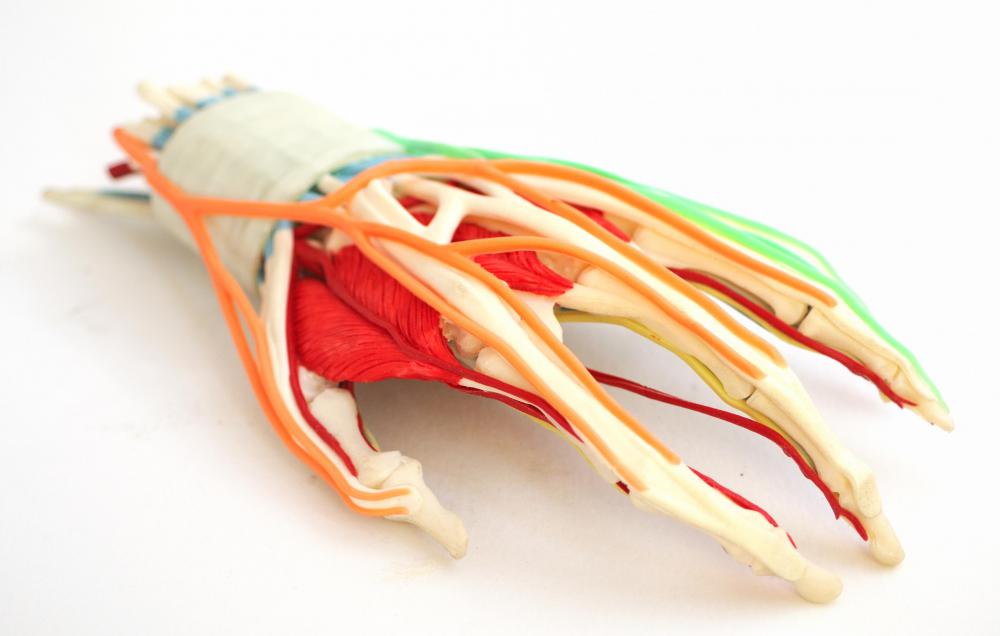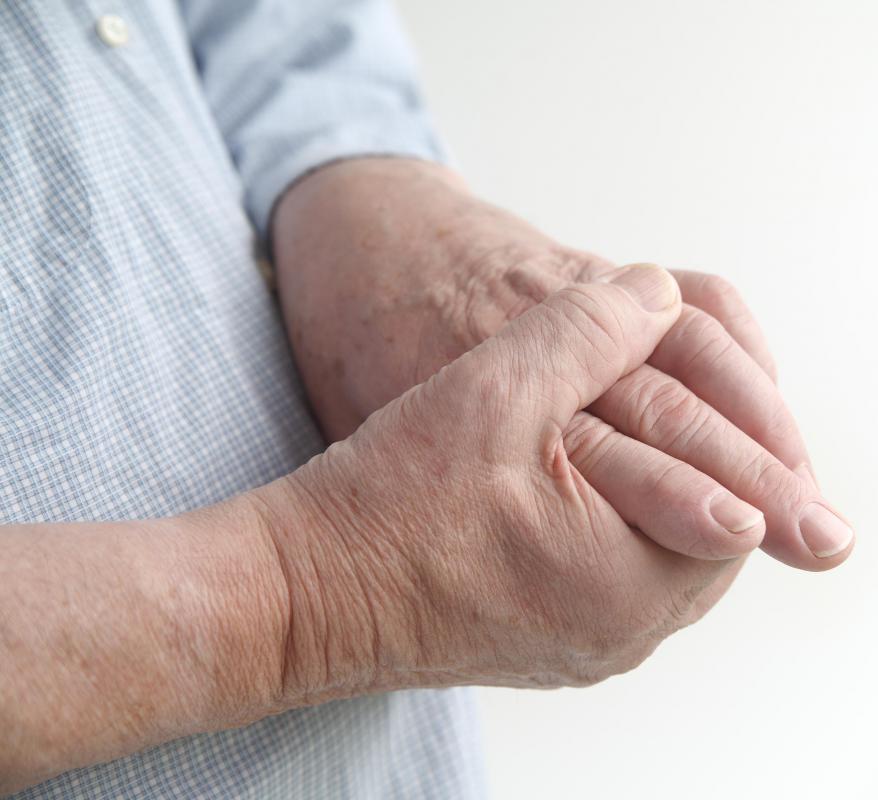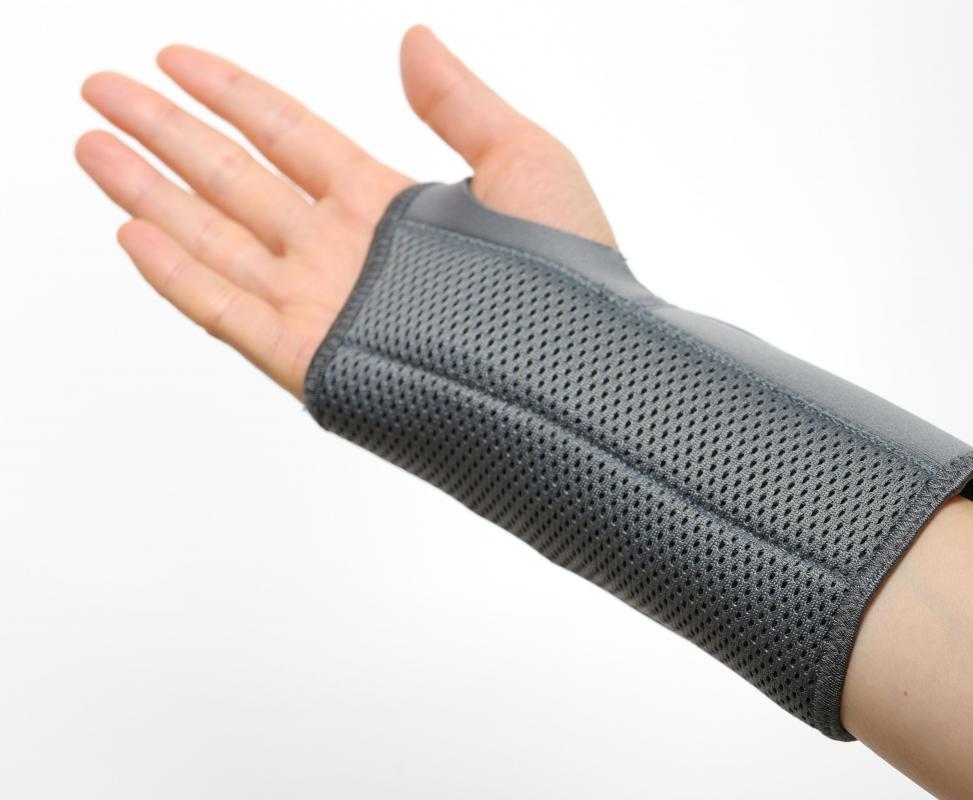At TheHealthBoard, we're committed to delivering accurate, trustworthy information. Our expert-authored content is rigorously fact-checked and sourced from credible authorities. Discover how we uphold the highest standards in providing you with reliable knowledge.
What are the Causes of Hands Falling Asleep?
There are many different causes of hands falling asleep, and most of them are the result of some type of nerve damage. Those with carpal tunnel syndrome and diabetes commonly have problems with tingling and numbness in fingers and hands, and in both cases, nerve damage is the probable cause. Hands falling asleep can also be associated with panic disorders and poor blood circulation.
Carpal tunnel syndrome is a condition that sometimes develops due to overuse of the wrist. The median nerve is a nerve that travels down the upper arm and into the hand. The nerve can eventually become injured with repetitive wrist movement, which can cause tingling and numbness in the hand. Sometimes people with carpal tunnel syndrome are unable to make a fist or hold onto small objects. Hand exercises can help restore nerve function, but in many cases, surgery is necessary to improve the condition.

Many people with diabetes may have problems with their hands falling asleep. The exact reason why this condition is associated with diabetes is unknown, but research seems to indicate it could be caused by nerve damage resulting from prolonged exposure to high glucose levels in the blood. Another theory is that hands falling asleep in people who suffer diabetes could be the result of damage to blood vessels, which sometimes leads to lowered levels of oxygen in the bloodstream.

Poor circulation can often cause numbness and tingling in different parts of the body, including the hands. Poor blood circulation can be caused by buildup of plaque in the arteries, which causes narrowing that makes it impossible for blood vessels to carry the necessary amounts of blood to different parts of the body. When blood flow is cut off or restricted, numbness and tingling can result. In some cases, numbness can be the temporary result of holding the arm or hand in one position for an extended period. Most of the time, movement of the arm or hand can restore circulation.

Many people who suffer from panic attacks report tingling in the areas of their faces and hands just prior to having an attack. This is believed to be a part of the body’s reaction to the “fight or flight” response when people are experiencing periods of extreme anxiety. This anxiety response can cause changes in blood oxygen levels and circulation that could in some cases lead to tingling and numbness in the extremities.
AS FEATURED ON:
AS FEATURED ON:


















Discussion Comments
I have been a Type I diabetic for 41 years, and the only time my hands fall asleep is when I'm playing the drums. After every song I have to do what I call the "hippy shake" to force the blood back into my hands.
I know quite a few people who are having trouble with carpel tunnel syndrome. They seem to be people who have done a lot of typing,writing, or worked as a grocery clerk. Wearing a brace helps them to function better, but eventually many need surgery to repair the nerve.
They've told me that they experience their hands falling asleep and tingling. But they also experience weakness, so even with a brace, they have difficulty manipulating their hands and fingers.
My hands have fallen asleep when I am sleeping and have been lying on them. It's kind of a weird and scary feeling. It also happens when I've been typing or writing for quite a while.
After I've been sitting on a couch with my foot under me watching TV or something, I'll get up and my foot has fallen asleep. For a few steps I'm not able to walk. But fortunately it returns to normal soon. The feeling of pins and needles isn't too pleasant.
The only time I can remember noticing my hands' falling asleep is if/when I am sleeping on them. It can be downright painful for me to sleep on my hands, but since I am sleeping, I really can't prevent it from happening.
Other than my hands falling asleep when I sleep on them, I don't think my hands have fallen asleep. When they do fall asleep, if I wake up soon after they do, then my hands easily "wake up".
The only time I feel pain from my hands falling asleep is when they have been asleep for a long period of time through the night. After like ten minutes, my hands feel okay and are not in pain anymore.
@golf07 – Actually, this is a huge problem for me as well. I think that the actual cause is nerve damage – sorry to be the bearer of bad news.
Well, maybe I’m being too hasty. I recently found out that my work at the computer has had some major effects on the nerves and muscles on my left side.
That’s not the only cause, but that is a great contributor to some extreme numbness, tingling and pain in my left hand, arm and shoulder.
I have actually had to greatly cut the amount of work that I do online (I’m a freelance writer) and had to take a bit of time off just to be able to work at all now.
I’m being told that the best way to handle the issue is to minimize stress and quantity, and also to take frequent breaks. Posture, apparently, is also important.
@golf07-- No, not unless I'm having an anxiety attack. I think the chair caused a change in blood flow to your hands and that's why they were tingling.
I suffer from anxiety and like the article says, when I'm having an anxiety attack, my hands, arms and feet tend to go numb. First I have trouble breathing, or it feels that way to me anyway. Then it's followed by tingling of my extremities and finally numbness. It usually starts with my hands and continues to my arms, feet, legs and even my face if the attack doesn't stop.
It's actually really scary but I've had them so many times that I can tell it's because of an anxiety attack. What I fear the most is my hands or feet falling asleep in extreme cold. Because then there's the risk of freezing and frostbite.
@StarJo – I think it's just because you are holding your arms and hands in one position for so long. Numbness can set in whenever you do this, whether you are holding your hands down, up, or sideways.
I often have to travel for work, and I spend a lot of time driving. Sometimes, my hands fall asleep after I have driven through a stressful area of traffic. This is because I kept them on the wheel in one position to make sure that I had control of the vehicle.
Of course, in my case, the fact that I am gripping the wheel tightly could be a factor in the hand swelling. I think mainly it happens because I'm not moving my hands, and that lowers my circulation.
Has anyone else noticed your hands falling asleep while roller skating? This has always happened to me, and I find it so strange.
After I've been skating for nearly an hour, I notice that my hands have swelled. They are red, puffy, and numb. It happens every time that I roller skate for an extended period of time.
My best guess is that because I keep my arms down at my side, the blood flows down there and has a tough time flowing uphill because of gravity. Maybe poor circulation is to blame. Does anyone know exactly what's going on?
In my line of work, I have to do a lot of typing and mouse clicking. During super busy times of the month that generally last for a week, my hands tend to fall asleep.
I know that it happens because of overuse. I just don't have a chance to give them a break. I have deadlines to meet and a boss who is pestering me to get things done, so I can't take “hand breaks.”
Once I get home, I move the muscles in my hands and fingers around slowly, stretching them. Sometimes soaking them in very warm water helps.
My hands and arms fell asleep while I was having an MRI. The radiologist told me to put my arms above my head before they put me inside the machine. They strapped some sort of board across my abdomen, and since there was no room to move around inside the machine, I was locked into position.
I had to stay in there for over thirty minutes. During that time, my hands and arms started to hurt a little. I could feel that they weren't getting enough blood and oxygen, but there was nothing I could do about it.
When it was over and I took my arms down, they felt like deadweight all the way through my hands to my fingertips. I could move them around, but I didn't get the feeling back until about thirty minutes later.
Does anybody else experience tingling hands when they spend too much time at the computer?
Many hours of my day are spent working on the computer and using my mouse. I know that it is important to take breaks every so often. It can also make a difference depending on where the height of your chair or desk is.
Once when I bought a new computer chair, I noticed a lot of tingling in my hands and feet and was concerned that something serious was going on.
My doctor friend told me it was because I made an abrupt change with the chair and should have gradually worked my self in to using it.
Once I got used to the new chair, I never had any more problems. I never would have thought that something as simple as using a different chair could cause my hands to tingle and fall asleep.
There are many times when my hands fall asleep at night. This is always such a strange feeling, as you can't feel anything until the blood gets circulating again.
I have never been concerned about this because this always happens to me when I am sleeping on one of my hands wrong.
Once I move it to a different position and wait a few minutes, everything is OK. This is the only time it happens to me, so have never given much thought to something else being wrong.
Post your comments